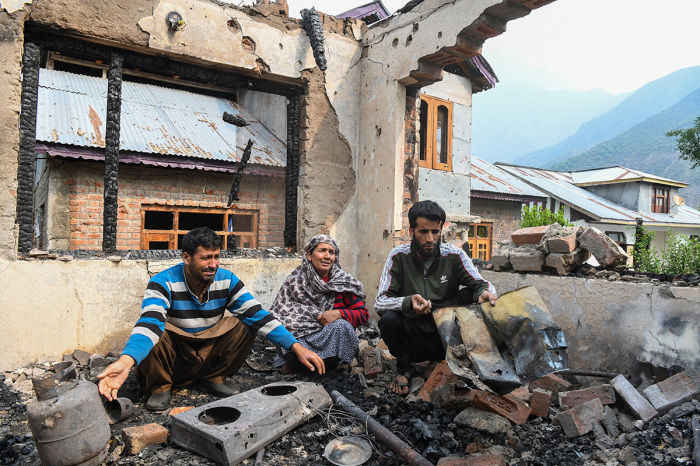Christian leaders united in prayer amid fears of India, Pakistan inching closer to full-scale war

President Donald Trump announced on Saturday morning that after a long night of U.S.-mediated talks, the nuclear-armed rivals of India and Pakistan agreed to a full and immediate ceasefire.
In a post on Truth Social, the president said, “After a long night of talks mediated by the United States, I am pleased to announce that India and Pakistan have agreed to a FULL AND IMMEDIATE CEASEFIRE. Congratulations to both Countries on using Common Sense and Great Intelligence.”
The conflict between India and Pakistan intensified Saturday as the two countries accused each other of ongoing drone and missile strikes.
U.S. Secretary of State Marco Rubio also celebrated the ceasefire agreement in a post on X Saturday, where he said that he and Vice President JD Vance had “engaged with senior Indian and Pakistani officials, including Prime Ministers Narendra Modi and Shehbaz Sharif, External Affairs Minister Subrahmanyam Jaishankar, Chief of Army Staff Asim Munir, and National Security Advisors Ajit Doval and Asim Malik” to work toward a peaceful solution.
“We commend Prime Ministers Modi and Sharif on their wisdom, prudence, and statesmanship in choosing the path of peace,” Rubio added.
Original report:
Christian leaders in India and Pakistan have jointly called for prayer and fasting as military tensions between the two countries escalate. Amid fears of a wider conflict, clergy across denominations are urging their communities to seek peace through spiritual solidarity.
Bishop Nadeem Kamran of the Anglican Church of Pakistan led a regional appeal for a joint day of fasting and prayer. Kamran told Christian Daily International that they would continue advocating for peace and reconciliation, warning that war would bring destruction neither country could afford.
Cardinals Oswald Gracias of India and Joseph Coutts of Pakistan, who met in Rome on Wednesday, reaffirmed their commitment to peace.
Speaking to Agenzia Fides, the two prelates referred to a collective appeal made by the College of Cardinals during the General Congregation on Tuesday, which included a plea for peace in global conflict zones.
The prayer appeals come against the backdrop of “Operation Sindoor,” an Indian military offensive launched on Tuesday in response to an April 22 terror attack that killed 26 tourists in Indian-administered Kashmir. India alleged Pakistan’s involvement in the attack. Operation Sindoor is named after sindoor, the red vermilion powder traditionally worn by married Hindu women.
Indian strikes reportedly hit nine targets across Pakistan-administered Kashmir and Punjab Province. New Delhi maintains it targeted terror hideouts associated with Jaish-e-Mohammed and Lashkar-e-Taiba and calls the strikes lawful reprisals. India reported eliminating numerous terrorists, including Abdul Rauf Azhar, a senior Jaish-e-Mohammed commander linked to the 2002 beheading of American journalist Daniel Pearl.
However, Pakistan’s military alleges the strikes killed 31 civilians and hit the Neelam-Jhelum Hydropower project and a mosque.
India has claimed that 16 civilians were killed in strikes carried out by Pakistan.
Pakistan claims it responded by downing three Indian jets and one drone. India has not confirmed that any of its jets were shot down. Pakistan also accused India of suspending the Indus Waters Treaty, a U.N.-sponsored agreement from 1960 governing water sharing between the two countries.
Pakistan has initiated “Operation Bunyan Ul Marsoos,” which translates to “Wall of Lead,” which involved launching Fatah-II ballistic missiles and drone strikes targeting over 25 Indian military sites, including airbases and missile storage facilities in the states of Gujarat, Punjab and Rajasthan.
India says its forces intercepted all missiles and drones. However, Pakistan claims damage to Indian military infrastructure, including the destruction of a missile storage site in the Beas region.
Despite international calls for de-escalation, including from the G7 and the United States, tensions remain high, with both countries placing their armed forces on heightened alert.
Bishop Kamran condemned terrorism in all its forms and urged both governments to resolve their differences through dialogue rather than warfare. He said only a joint strategy could deal with terrorism without inflicting harm on innocent civilians.
The Rev. Reuben Qamar of the Presbyterian Church of Pakistan supported Kamran’s appeal, pointing to the severe implications of India’s suspension of the Indus Waters Treaty. He described the move as a threat to Pakistan’s water security and warned of serious humanitarian consequences.
Within India, the Catholic Bishops’ Conference has also weighed in.
Bishop Theodore Mascarenhas, speaking to Fides after a meeting of over 30 bishops in Jharkhand state, said Indian church leaders were united in urging peace. The group called for de-escalation, insisting that even state-level disputes could be resolved without violence.
The Rev. John Gilmore, president of the National Council of Churches in Australia, condemned the targeting of civilians and urged the international community to act.
The World Council of Churches also appealed for restraint, warning that continued violence would bring suffering to millions.
On the ground, India has begun evacuating civilians from villages near the Kashmir border. Pakistani officials, meanwhile, say Indian drone strikes reached as far as Lahore and Karachi.
Clashes have intensified along the Line of Control, where India says 13 civilians were killed and 59 injured in recent gun battles.
Christian lawmakers in Pakistan have also endorsed the call for peace.
Ejaz Alam Augustine, a Christian member of the Punjab Provincial Assembly, said Christians fully supported the military while continuing to pray for peace. He stated that all four Christian legislators in the Punjab Assembly backed Bishop Kamran’s prayer initiative and encouraged citizens on both sides to join hands for reconciliation.
The Christian Conference of Asia, a Thailand-based regional ecumenical organization, expressed concern about the rising persecution of religious minorities amid the conflict, including Christians, Hindus and Ahmadis, according to Anglican Ink.
The combined population of India and Pakistan exceeds 1.6 billion. Christians are a minority in both countries and face severe persecution.

















